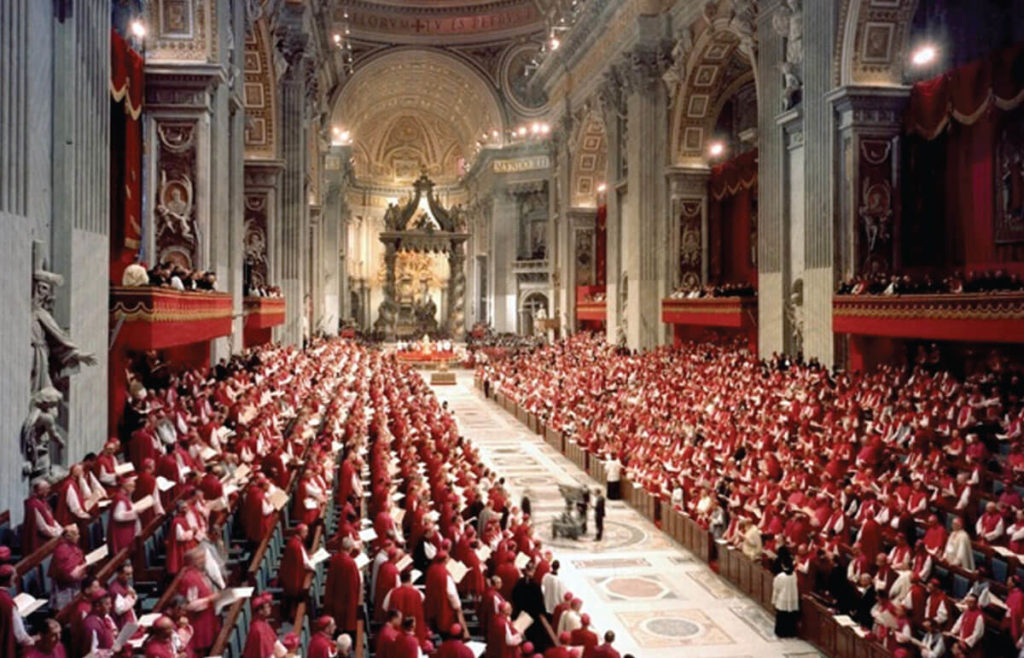
Jesus insists in Sunday’s gospel that his kingdom is not of this world. He reigns through the loving actions of his followers, not armies. In the Our Father, his own prayer, Jesus prays that God’s kingdom will come and God’s will be done on earth as it is in heaven.
Between 1962 and 1965, the Second Vatican Council updated the Church and renewed its commitment to make Jesus’ prayer real. In the decades before the Council many Catholics lived a spirituality that focused on getting to heaven. They tended to accept suffering and poverty because God would reward people in heaven.
The Council called us to be our brothers’ and sisters’ keepers on earth. The first sentence of the Constitution on the Church in the Modern World insists:
The joys and hopes, the griefs and anxieties of the people of this age, especially those who are poor or in any way afflicted, these, too, are the joys and hopes, the griefs and anxieties of the followers of Christ.
Like all Church documents the title of this document comes from its first words, which in Latin are Gaudium et Spes or in English Joys and Hopes. After this teaching Catholics developed a spirituality of solidarity with the poor.
“In no other age has humanity enjoyed such an abundance of wealth, resources and economic well-being,” the Council says of the modern world. “Yet a huge proportion of the people of this world is plagued by hunger and extreme need while countless numbers are totally illiterate (Gaudium et Spes #4).
The bishops of the Council observed, “The hungry nations cry out to their affluent neighbors; women claim parity with men in fact as well as of right, where they have not obtained it; laborers and agricultural workers insist not just on the necessities of life but also on the opportunity to develop by their labor their personal talents and to play their due role in organizing economic, social, political, and cultural life (Gaudium et Spes #9).
The Second Vatican Council emphasized the common good. This concept provides people in politics and government a way to talk about and negotiate the many needs of people in our world. “The common good is the sum total of social conditions which allow people, either as groups or as individuals, to reach their fulfillment more fully and more easily. Every group must take into account the needs and legitimate aspirations of every other group, and even those of the human family as a whole” (Gaudium et Spes #26).
The work of solidarity is making sure that our neighbors have food, clothing, shelter, education, and health care. Today’s world is global. Catholic Relief Services is the way U.S. Catholics extend our care around the globe.
Solidarity asks us to help when people experience disaster or famine but even more to help all people become self-sustaining.
Solidarity asks us to treat immigrants and migrants as brothers and sisters. It asks us to find ways to help people become part of the world economy without being cheated for cheap labor or cheated out of natural resources.
Solidarity asks us to promote education for girls in the developing world. It asks us to raise funds but also to make friends across continents. All are responsible for all.
The Council challenges us. “Today there is an inescapable duty to make ourselves the neighbor of every individual without exception, and to take positive steps to help a neighbor whom we encounter, whether that neighbor be an elderly person abandoned by everyone, a foreign worker who suffers the injustice of being despised, a refugee, an illegitimate child wrongly suffering for a sin of which the child is innocent, or a starving human being who awakens our conscience by calling to mind the words of Christ: ‘As you did it to one of the least of these my brothers and sisters, you did it to me’” (Matthew 25.40; Gaudium et Spes #27).
